May 9, the Victory Day is a crucial symbolic date. We should expect the Victory Parade and Putin's speech to the nation on that day. What is he gonna say? Many are pondering whether he will:
1. Declare war on Ukraine
2. Declare mass mobilisation in Russia
Let's discuss both🧵
1. Declare war on Ukraine
2. Declare mass mobilisation in Russia
Let's discuss both🧵
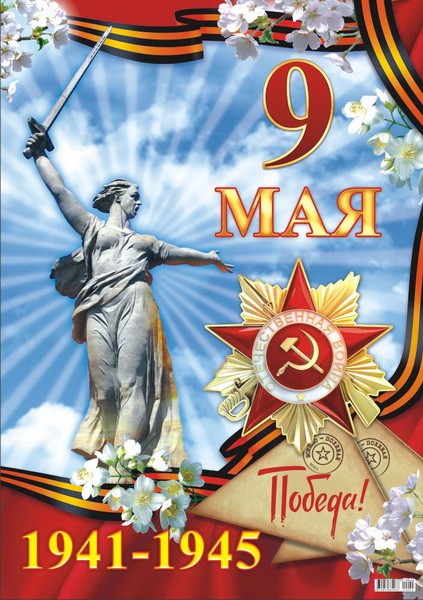
Let's start with the question - why Putin didn't declare the war on Ukraine yet? Well, probably because he didn't expect any serious resistance. Kremlin planned for another Czechoslovakia 1968 and was very much surprised it didn't happen. Hence the "Special Operation" terminology 
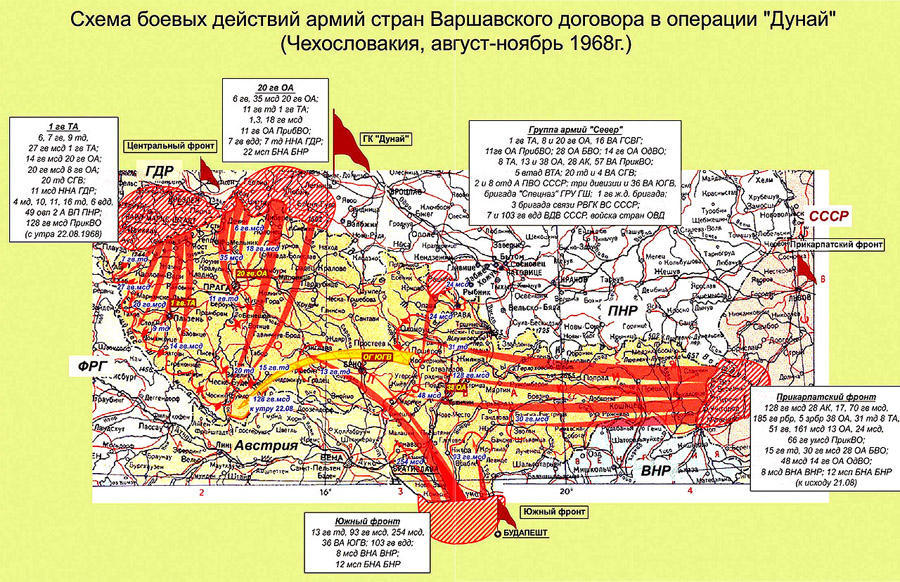
Planning for another pacification of an East European satellite state, Moscow unexpectedly got into a major war it didn't prepare for. Since they didn't prepare for a war, they declared neither a war, nor a martial law. Which had major consequences for the course of this war
Russian state policies may not be legal. But they absolutely are procedural. It is a machine acting according to an algorithm. More specifically, the war and the martial law are largely regulated by the algorithm described in 30.01.2002 г. № 1-ФКЗ. Which has not been activated 
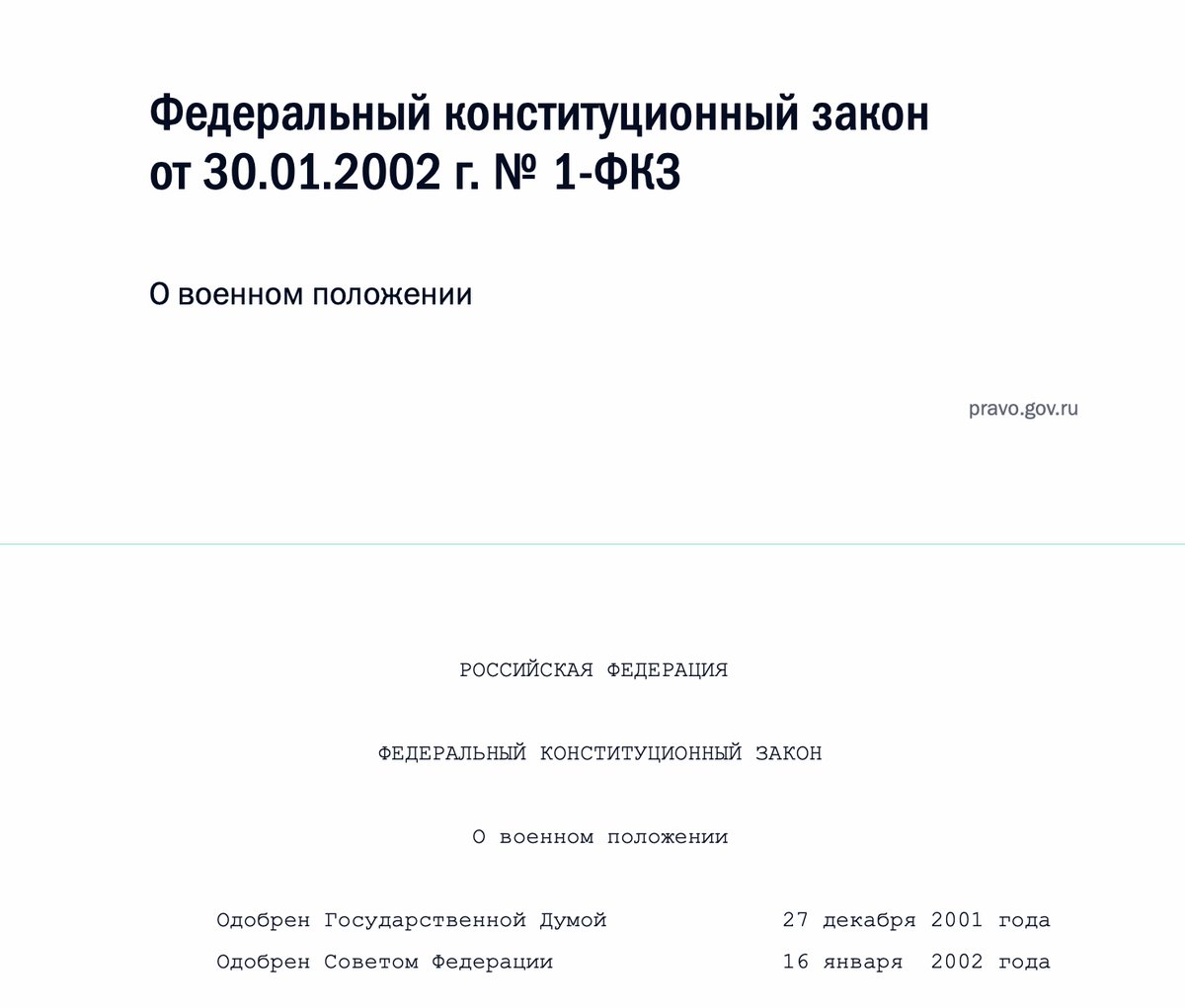
As the martial law algorithm was not activated, procedurally speaking Russia is now in peace. Thus all the peace time procedures are still valid. In practical terms, it means that the army, the National Guard and other contractors can just leave their job. See Strelkov's lament:
Many either leave their jobs or refuse to go to war. According to Russian media, dozens or hundreds of Krasnodar OMON, Crimean marines, Pskov airborne, soldiers from South Ossetia, Hakas National Guard refused to fight. Watch a dialogue of a National Guard boss with his fighters:
In other words, desertion from the Russian military is now legal as long as you are a paid contractor. Ofc army and National Guard bosses try to prevent that. Some issue executive orders forbidding the military to quite their jobs until "their special goals are completed" 

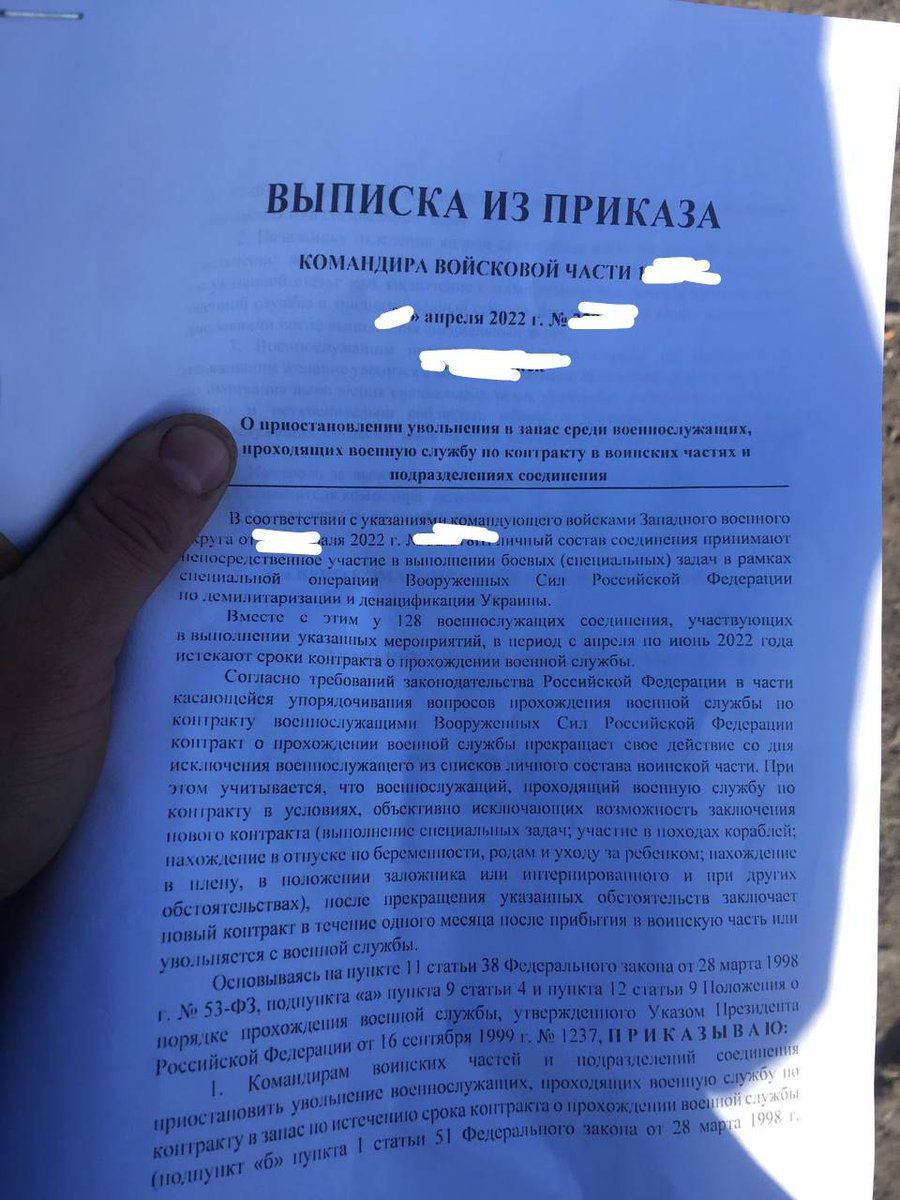
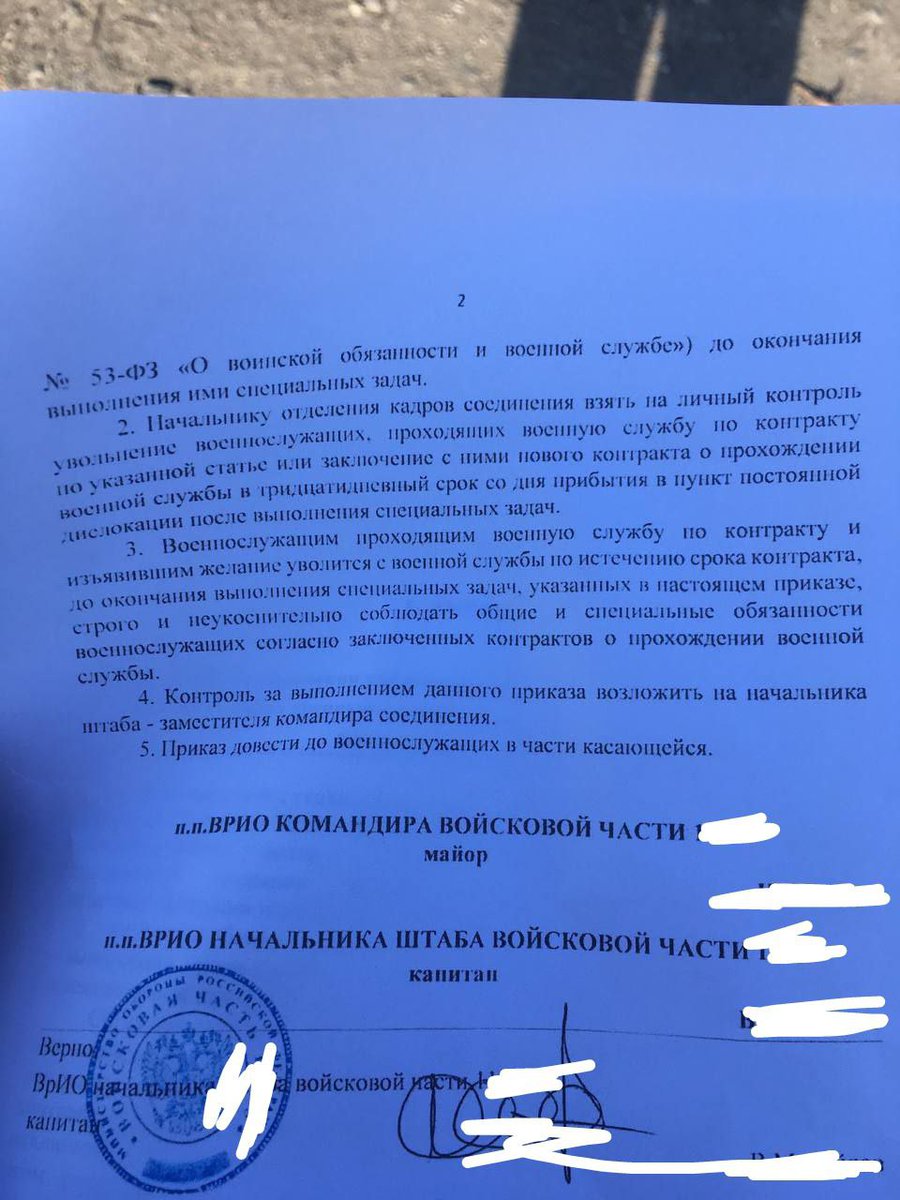
Some commanders try to destroy the record of the military who quit, putting a special notes or stamps into their military IDs (военный билет), personnel files, etc. That however has little effect on your future unless you plan to work for the state. Besides, you can sue them 

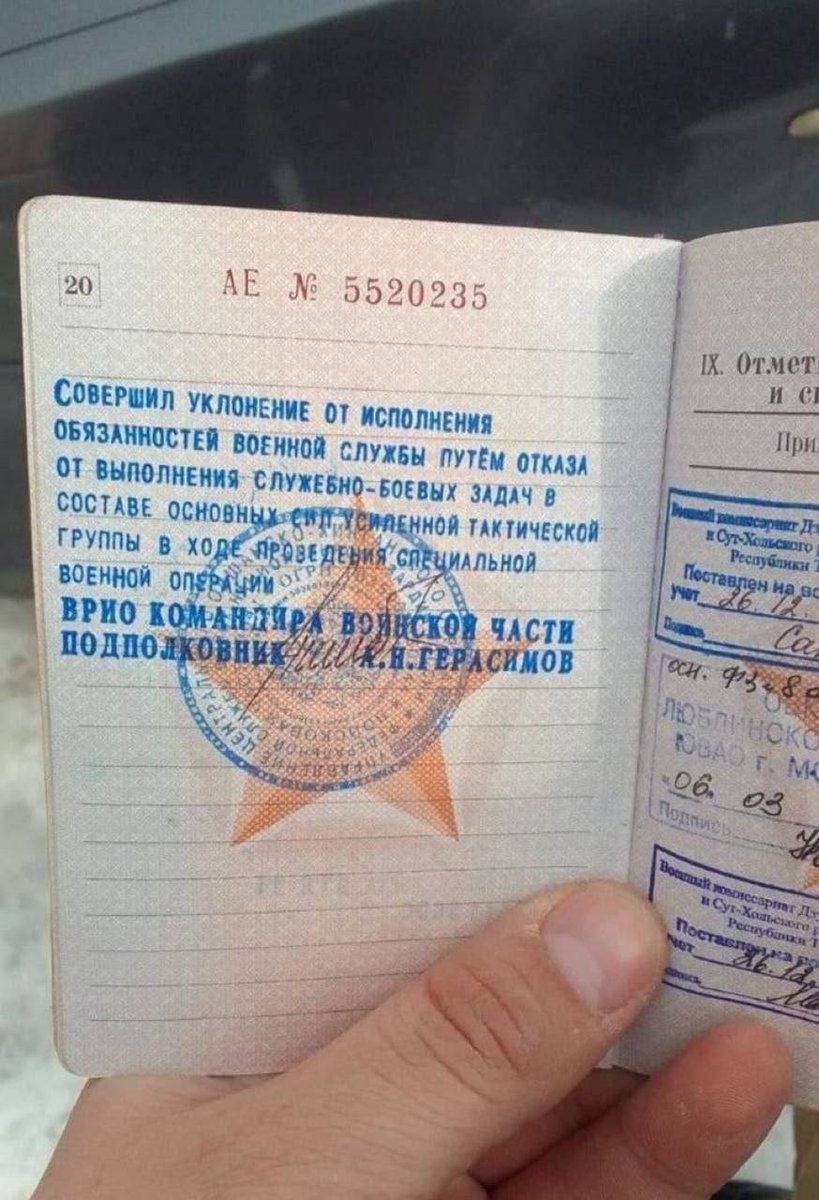
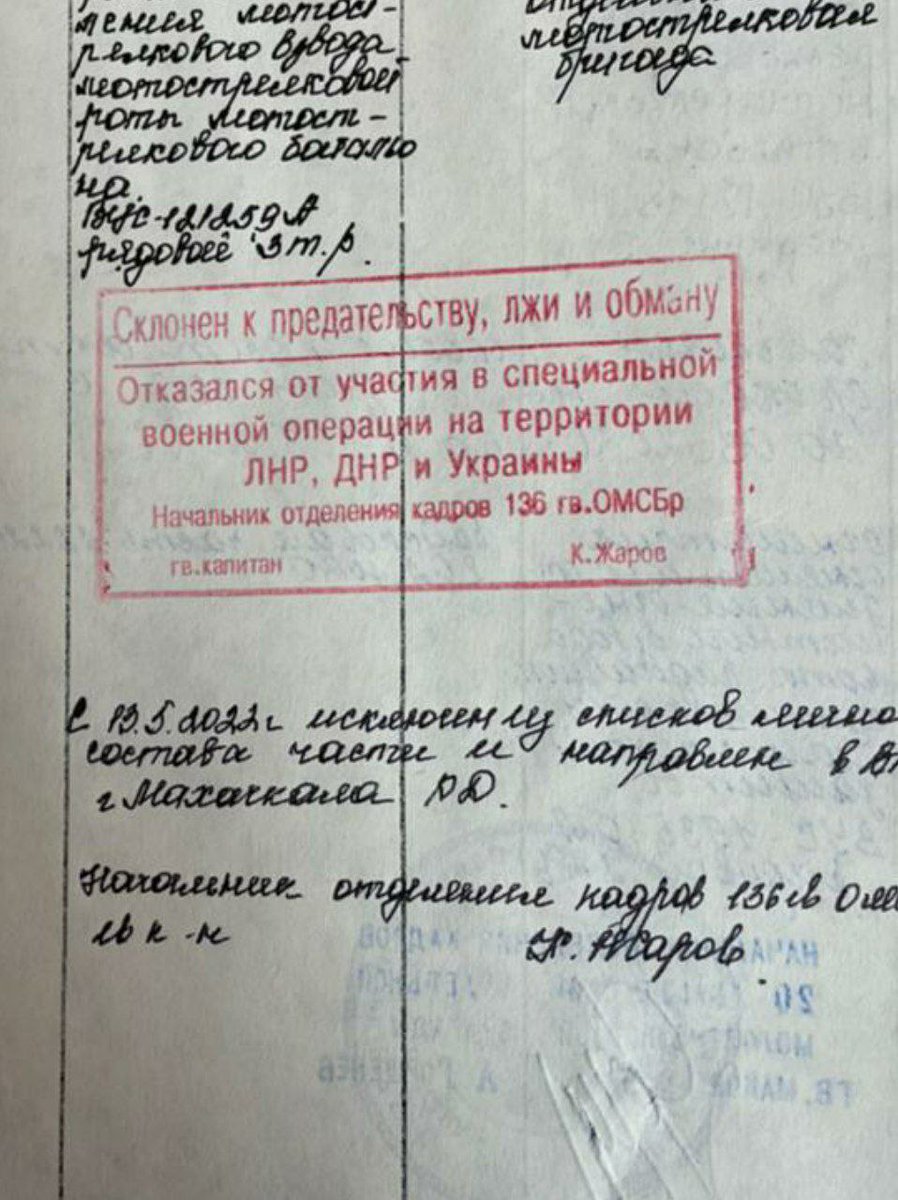
Those troops who already departed to war and were later returned, refused to go again. For example, after the VDV were massacred in Ukraine, around 100 airborne from Pskov who were returned home from Belarus, refused to go to the war again rus.err.ee/1608558379/gla…
In practical terms that means that the ability of Russia to regroup, withdrawing its forces from the North (Kyiv) in order to send everyone to the East (Donbass) was probably exaggerated. Many of those who already been to Ukraine and were returned to Russia simply won't go again. 
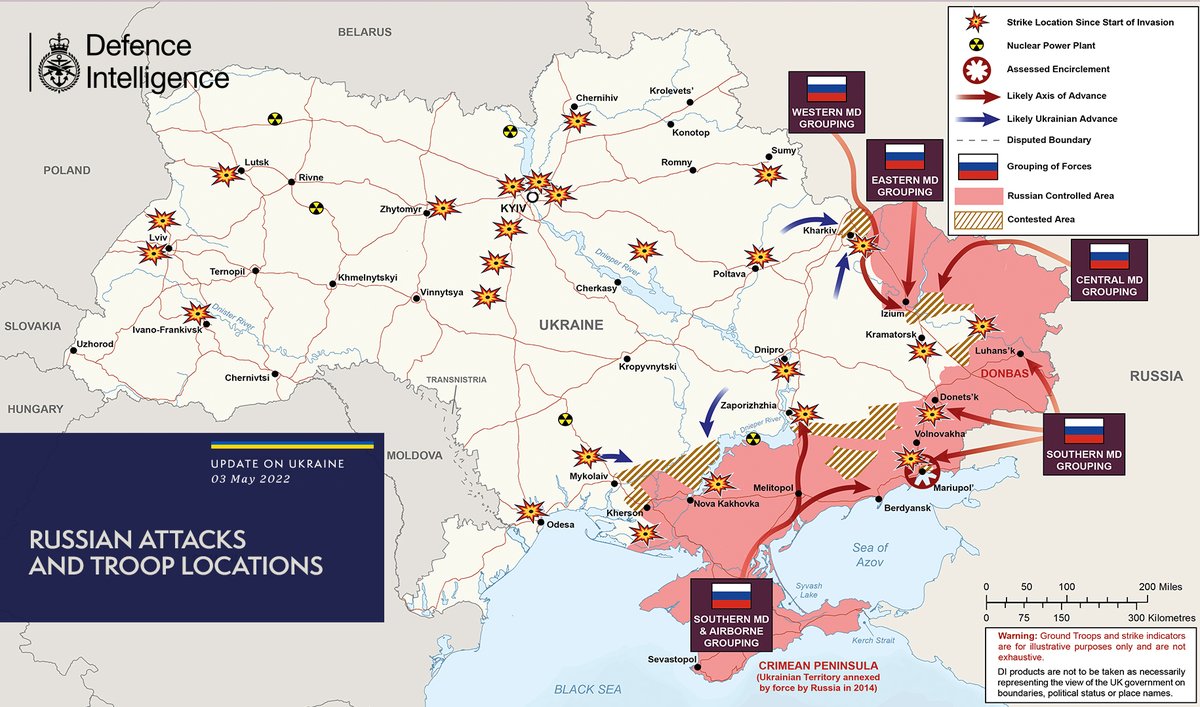
Situation with conscripts is a bit different. Technically sending conscripts to Ukraine is illegal. And yet, they did it ofc. Russian state basically admitted it, and Putin ordered the military prosecutors to "investigate the case". My prediction: no army boss will be punished 
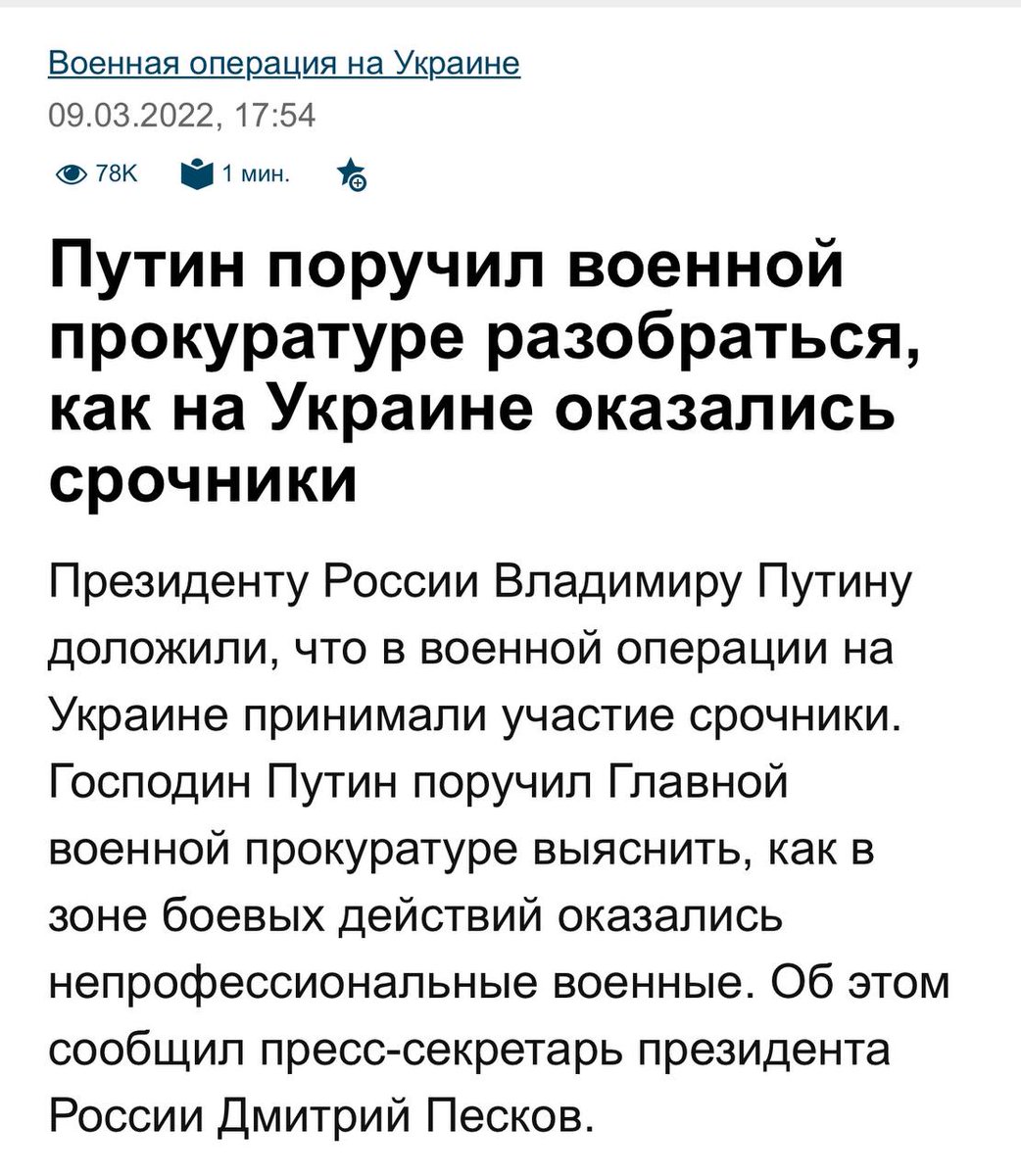
Putin using conscripts in a foreign war was very predictable. Since at least the New Year, the Soldiers mothers NGO was getting tons of calls from concerned parents whose conscripted sons were transferred to the Ukrainian border. There were so many of them, it couldn't be a drill
"Go and take them from there" a secretary of the Soldiers' mothers would tell. "Or just tell them to run away, hide somewhere and write complaints to the military prosecutors"
"But not a single daughter of a bitch, not a single son of a bitch didn't go anywhere" concludes she
"But not a single daughter of a bitch, not a single son of a bitch didn't go anywhere" concludes she
In other words, parents of conscripted soldiers could totally use the procedural nature of the Russian state to prevent their sons from being sent to Ukraine. Nobody did. Why? Partly because of the lack of agency. Russian state extirpated any forms of agency for centuries
Uprooted sense of agency & personal responsibility is an elephant in the room. After this war Russians will need a rehabilitation course to regain them again. But such a rehabilitation is incompatible with the existence of the Russian state which uprooted them in the first place
Dismantling of the Russian state is necessary not only for preventing further attempts of imperial restoration and thus large military conficts but as a necessary condition for a rehabilitation which would restore the sense of agency and personal responsibility
Majority of the Russian population believe they can't do anything, their personal actions have no impact and the best they can do is submit. Which is not wrong. In such massive empire their voice has no weight and no impact. Thus the empire must be dismantled to smaller polities
Tsars, Communists, Putin, all worked hard to uproot the personal agency in Russia. Navalny & Co. will work even harder, should they take power. Dismantling the empire will scale the politics down which is a prerequisite for people regaining the feeling that their actions matter
Interpreting Russian politics in terms of "Putin vs Russian people" dichotomy is an awful approach. Why? Because Putin is a subject while the "Russian people" are not. They are merely an abstraction that allows an autocrat and a gang of courtiers to legitimise their rule
"Russian people" doesn't exist as a subject, it's a tool for the legitimisation of an autocracy. Right now Putin legitimised his power by pretending to represent the "Russian people" with no agency. Should the regime change happen, Navalny and his courtiers will do the same
Why should * any* autocrat and his gang of courtiers in Moscow have the right to represent the "Russian people" and do whatever by their name? Let them represent themselves. And the entire political structure should be scaled down exactly so they could represent themselves
What I don't like about the Western media is that they have a very weird bias when representing the "Russian voices". They almost exclusively give word to such figures as Navalny, Khodorkovsky, Kashin etc. To the "liberal" (=nationalist) establishment of Moscow
The problem with Navalny, Khodorkovsky, Kashin etc is not only that they r all ethnic Russians in an increasingly diverse country. The problem is not only that every single of them publicly proclaimed himself as a Russian nationalist. The problem is that they are all from Moscow
The fact that the Western media and the cultural establishment almost exclusively gives the word to the "liberal" (=nationalist) establishment of Moscow means that they're effectively deplatforming all other voices and reinforcing the idea that only the Moscow should have a voice
This policy of exclusively giving the word to the Moscow establishment makes sense only if Moscow is truly the only subject in this country and all others are a cattle to be guided and disciplined. Who have no opinion of their own and if they do, it doesn't matter anyway
My point is: let's question this assumption. Let's assume that people all around the country have voices which matter. And if we don't hear them, it's largely because they're being systematically ignored or deplatformed by both Russian and Western media and cultural establishment
Instead of taking a 100th interview from a "liberal" politician from Moscow, who's liberalism consists in aspiring to become yet another Tsar or a courtier, why don't you interview people from Khabarovsk or Yekaterinburg? Have you even tried to ask what they think?
Like recently a German journalist told me that "we" don't see any evidence of wide discontent in Russia. The question is - who are "we" here. Apparently those who invested a lot of time and effort in not noticing any form of regions identity, agency or action
This determination to ignore the regional agency is reflected in the fact that when discussing the possible collapse and dismantling of Russia, Western analysts almost exclusively focus on ethnic minorities and ethnic republics. They completely ignore the non-ethnic regionalism
Apart from defeating Putin and establishing a weak peace to be broken by the next Tsar, we must work on re-enfranchising the Russian population. The first thing to do is to give voice to the unheard, especially from the regionalist movements, in the Far East, in Siberia, in Urals
I'll go into details in further threads on why I stand against the Moscow liberals and on the National Divorce scenario of the Russian future. For now I'll just express my surprise in how much effort do the media invest in ignoring and deplatforming non-Moscow voices from Russia
Now let's return to the prospects of a total or partial mobilisation which may be declared on May 9. The problem with the total mobilisation is that Russia has no capacity to do it properly. The USSR could, while Russia absolutely can't
Soviet military doctrine was designed for the total mobilisation. In practical terms it meant that the army and the military infrastructure was ready for the quick and enormous expansion of its ranks and the huge inflow of untrained or poorly trained conscripts
Soviet army had way more officers in its divisions than it needed to lead the peace time number of soldiers. Why? Because after the mobilisation the ranks of the army (and of its divisions) would expand quickly and now it would need those extra officers to command new recruits
Furthermore, the Soviet army maintained a costly infrastructure of training facilities (to train soldiers) and of military schools (to train officers). As the cadre officers would suffer heavy casualties, the USSR had to train new officers from civilians in those schools
Anecdotally, one Soviet artillery officer recalled how he was recruited. During the WWII a group of newly mobilised recruits were told to sit down and write "синус" (sinus). Those who wrote "sin" were sent to the officer schools, while those who couldn't - to foot soldier ranks
Soviet Union maintained a massive infrastructure in case of the world war and mass mobilisation. And yet, it was super costly and made little sense in the absence of such a war. Much of it declined in the 1990s and whatever remained was dismantled during the Serdyukov's reforms
Minister Serdyukov launched a sensible reform to create a professional (contractor) army always ready for a conflict. In practice however it meant that the military doctrine changed and the new one didn't include an option of a mass mobilisation at all
Facilities to train the gargantuan number of soldiers and officers from recruits are closed. Extra officers in existing divisions who would lead those recruits into battle were fired. Many of cadre officers Russia still has are now in Ukraine and many are already KIA
To sum up. Russia has the capacity to draft the enormous number of recruits via a mass mobilisation. It has no capacity to train them, provide them with required equipment or with officers' leadership. Which means that a mass mobilisation would be a really dumb decision
Declaring a mass mobilisation would be dumb. And yet, that does *not* mean that Putin wouldn't do it. He can. As a general rule, prognosing a leader's decisions based on "common sense" or on "logic" is largely counterproductive. A leader absolutely can do something dumb
As Guicciardini taught us
"In a business of state, we must focus not on what we think a prince should do, but on what he'll probably do judging from his nature and his habits"
"In a business of state, we must focus not on what we think a prince should do, but on what he'll probably do judging from his nature and his habits"
Judging from the Putin's nature and habits, I would estimate a probability of him declaring a mass mobilisation on May 9 at 20%. He can raise the stakes largely for the PR effect and for boosting his legitimacy. It however, will probably be a grave mistake
Consider the following. If a mass mobilisation is really declared, Russian military bases and existing training facilities would be overflown with a mass of poorly motivated recruits under unmotivated & incompetent leadership (more motivated and competent leaders are in Ukraine)
You can't just send a recruit into a frontline assault. You need to at least give him *some* equipment, provide a basic training on how to use it, place him under someone's command and them ship them all to Ukraine. Meanwhile, you need to quarter and feed them somewhere
Putin absolutely can declare the mass mobilisation. But it will be conducted in a situation of almost no infrastructure and almost no organisational capacities for such a mobilisation and within a military doctrine that effectively excludes a possibility of such a mobilisation
In case of total mobilisation, we'll have barracks and training facilities overcrowded by the enormous number of poorly motivated recruits under a weak leadership. And these recruits know they'll be sent to Ukraine where they are likely to be KIA. That's a revolutionary situation
As a general rule, we tend to hugely exaggerate the role of unarmed civilians & underrate the role of people with guns in any civil conflict. That's partially wishful thinking and partially an ideology which deliberately focuses on "non-violent protests" and ignores anything else
Right now I estimate the probability of a *successful* mass revolt in Russia as close to zero. In case of the mass mobilisation however, it gonna skyrocket. You'll have tons of armed people with an immediate self-interest in overthrowing the regime. That's the scenario of 1917
The major (and underrated) ofc factor of the 1917 revolution in Russia, or rather a chain of successful coups were the people with guns. More specifically, the garrison of St Petersburg (Petrograd) and the Baltic Navy based in Kronstadt, which is very close to the capital
"The people" would have no chance to overthrow the Tsar unless the Tsar:
1. mobilised them
2. brought to the capital
3. trained and gave them guns
4. made sure they have an immediate self-interest in his overthrow, because otherwise they would be sent to WWI and massacred there
1. mobilised them
2. brought to the capital
3. trained and gave them guns
4. made sure they have an immediate self-interest in his overthrow, because otherwise they would be sent to WWI and massacred there
1917 scenario was predictable. By November 1916 Nicholas II possibly have suspected his minister of interior Protopopov of scheming against him and was already looking for other candidatures. He offered this cabinet position to Kryzhanovsky. Kryzhanovsky sent his conditions 
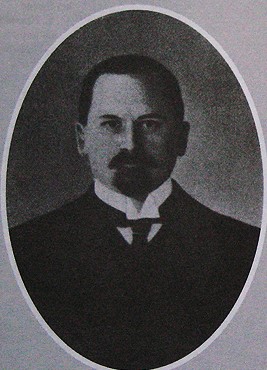
1. Return the Guard Cavalry (= the richest & most privileged nobility regiments) to the capital
2. Transfer a part of gargantuan 460 000 conscripts-composed garrison on the capital to police (= hey, we won't send you to war)
3. Get the rest of the garrison out of the capital
2. Transfer a part of gargantuan 460 000 conscripts-composed garrison on the capital to police (= hey, we won't send you to war)
3. Get the rest of the garrison out of the capital
That was a very realistic plan that aimed to reduce the revolutionary risks. Tsar rejected it and Kryzhanovsky refused to become a minister of interior. Less than three month later, the Tsar was overthrown, largely by the same garrison of the capital and the empire fell
I will argue that as a general rule scholars and analysts exaggerate the importance of ideologies. They're hommes de lettres and largely presume that everyone else is just obsessed with lettres and some high-brow logical constructs as they are. But that's not the case
What scholars and analysts tend to underrate is the position of some conscripted uneducated bumpkins from province that just happened to be armed and quartered in capital in numbers of 460 000. But these bumpkins are way more important as a revolutionary factor than intellectuals
Those conscripted bumpkins may have little interest in complex logical constructs. But they absolutely do have agency and self-interest. Also they have guns. Also there is almost half a million of them. Ergo, their position means everything and that of intellectuals - nothing
Consider the following. When Lenin returned to Russia in April 1917 he called for stopping the war immediately (Апрельские тезисы). The Bolshevik Party was shocked by such a madness. His own party comrades, other Bolshevik leaders criticised or condemned him, or were in disbelief 
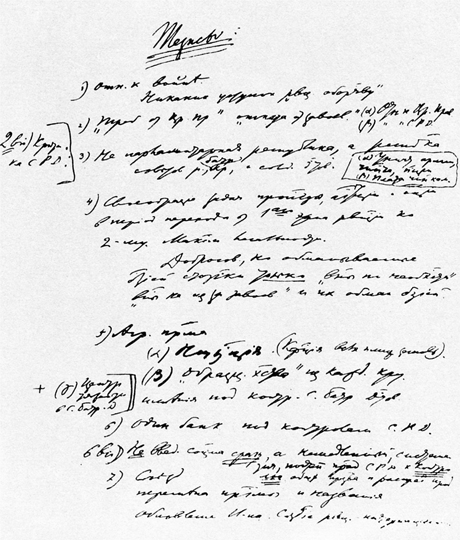
Why was the Bolshevik leadership shocked by the suggestion to overthrow the Provisional Government and stop the war? Largely because nearly all of the educated classes, of the high-brow people were in favour of continuing the war. What an idiot would stop on the brink of victory?
Why Lenin's call for stopping the war immediately wasn't supported by other Bolsheviks? Why were they shocked? Since nearly all the high-status people stood for the war till the victory, the idea to stop it would immediately be associated with the low status
Most Bolshevik leaders were normal people in a sense that their actions and decisions were overwhelmingly motivated by the considerations of status. You do and say what will raise your status in your reference group and avoid whatever you gonna be ostracised for. This is the way
That's why (normal) Bolsheviks were shocked by their leader taking such a low status position. They correctly understood that the Lenin's (and the Bolshevik Party) status will drop immediately and irreversibly. They are gonna be mocked and ostracised. Why would Lenin do that? 
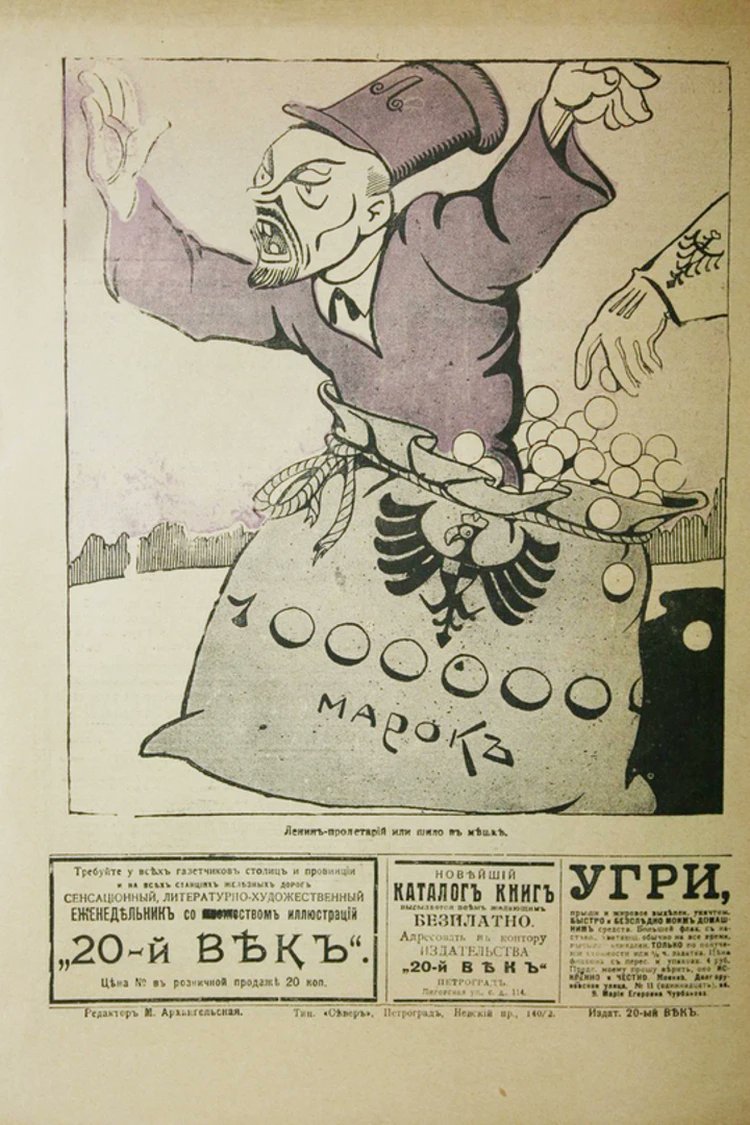
What they didn't understand however is that Lenin wasn't normal. Status and social acceptance meant everything to them and nothing to him. Now and many more times he would take wildly unpopular (among even the Bolsheviks) decisions and enforce them crushing any protest 
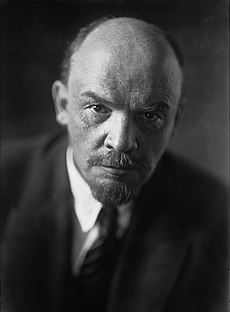
Unlike most Bolshevik leaders, Lenin had very accurate understanding of reality. And the reality of 1917 was half a million of *very* simple armed people concentrated in the capital with an immediate self-interest to stop the war (=avoid the trenches) at any cost 
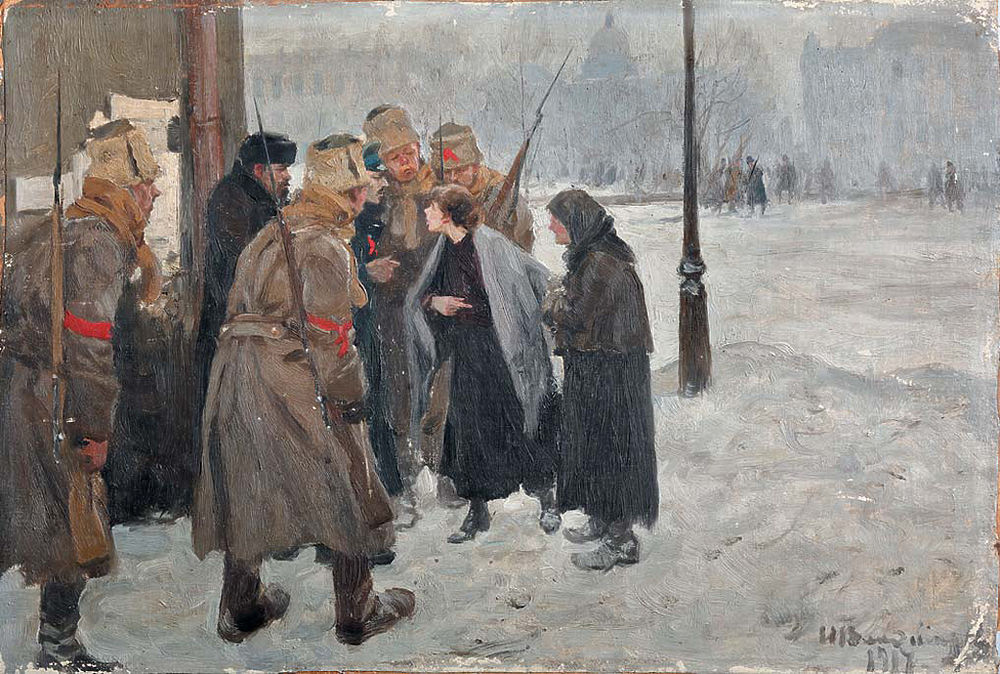
Since these uneducated but armed bumpkins were the main military force in the imperial capital, their position was the only one that mattered. While the position of politicians and intellectuals was merely a white noise which Lenin absolutely could (and should) ignore. End of 🧵 
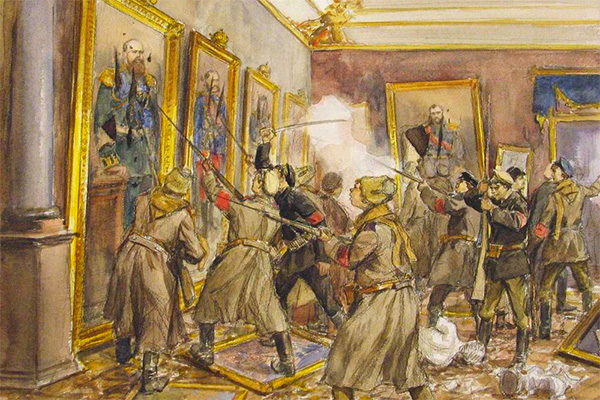
• • •
Missing some Tweet in this thread? You can try to
force a refresh





